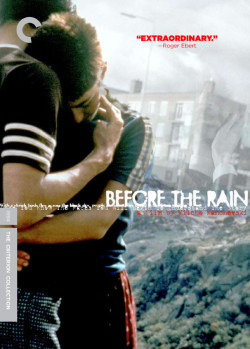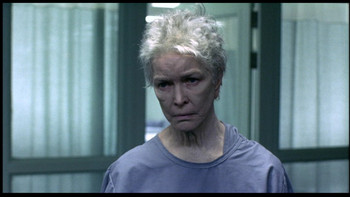 The first images of Jim Kurring involve his morning routine, and it’s nothing remarkable: He eats, he showers, he reads the paper, he exercises. But there are little hints about how we’re supposed to react to him. He laughs out loud – and not very convincingly – at something on the Today show. When he’s lifting weights, we see one of those inspirational posters encouraging “determination.” And he prays, on his knees at the foot of his bed, with a cross looking down upon him. When he finishes, he gets up and claps his hands together once, as if Team God had just broken from the huddle. We learn through voice-over that he participates in some dating service, or at the least runs a personal ad. He’s a cop, and he gives himself a pep talk in the squad car.
The first images of Jim Kurring involve his morning routine, and it’s nothing remarkable: He eats, he showers, he reads the paper, he exercises. But there are little hints about how we’re supposed to react to him. He laughs out loud – and not very convincingly – at something on the Today show. When he’s lifting weights, we see one of those inspirational posters encouraging “determination.” And he prays, on his knees at the foot of his bed, with a cross looking down upon him. When he finishes, he gets up and claps his hands together once, as if Team God had just broken from the huddle. We learn through voice-over that he participates in some dating service, or at the least runs a personal ad. He’s a cop, and he gives himself a pep talk in the squad car.
 For the first time since fall 2006, I updated the 100 Favorite Movies feature of Culture Snob. Thirteen movies were added, and 29 went away. Yes, “100 Favorite Movies” for two years listed 116 movies. I could explain and justify this mathematical conflict, but I’ll spare you; just call me an idjit instead.
For the first time since fall 2006, I updated the 100 Favorite Movies feature of Culture Snob. Thirteen movies were added, and 29 went away. Yes, “100 Favorite Movies” for two years listed 116 movies. I could explain and justify this mathematical conflict, but I’ll spare you; just call me an idjit instead.
 Lars von Trier’s Antichrist in 560 characters over four Tweets: descriptive, positive, a turning point, and ultimately (in both the “finally” and “fundamentally” senses of the word) negative.
Lars von Trier’s Antichrist in 560 characters over four Tweets: descriptive, positive, a turning point, and ultimately (in both the “finally” and “fundamentally” senses of the word) negative.
 The first images of Jim Kurring involve his morning routine, and it’s nothing remarkable: He eats, he showers, he reads the paper, he exercises. But there are little hints about how we’re supposed to react to him. He laughs out loud – and not very convincingly – at something on the Today show. When he’s lifting weights, we see one of those inspirational posters encouraging “determination.” And he prays, on his knees at the foot of his bed, with a cross looking down upon him. When he finishes, he gets up and claps his hands together once, as if Team God had just broken from the huddle. We learn through voice-over that he participates in some dating service, or at the least runs a personal ad. He’s a cop, and he gives himself a pep talk in the squad car.
The first images of Jim Kurring involve his morning routine, and it’s nothing remarkable: He eats, he showers, he reads the paper, he exercises. But there are little hints about how we’re supposed to react to him. He laughs out loud – and not very convincingly – at something on the Today show. When he’s lifting weights, we see one of those inspirational posters encouraging “determination.” And he prays, on his knees at the foot of his bed, with a cross looking down upon him. When he finishes, he gets up and claps his hands together once, as if Team God had just broken from the huddle. We learn through voice-over that he participates in some dating service, or at the least runs a personal ad. He’s a cop, and he gives himself a pep talk in the squad car. Chris Thile doesn’t like musical boundaries, and the mandolin player seems to almost relish pissing off those who would prefer to pigeonhole him.
Chris Thile doesn’t like musical boundaries, and the mandolin player seems to almost relish pissing off those who would prefer to pigeonhole him. One thing you might notice picking up Daniel Woodrell’s novel Winter’s Bone is how thin it is – less than 200 pages. And when you start reading, you might be struck that it’s been carved incredibly lean. While relatively plainspoken, the sentences are dense, with a mix of dialect from the Ozarks and artfully turned idioms that feel instantly right. One has to sip Woodrell’s language. “I do like to make it apparent to the reader that you need to probably read everything,” Woodrell said in a phone interview in April. “‘I won’t put in any flab, but you have to read what’s here’ is kind of my deal with the reader. … Pay attention to the sentences.”
One thing you might notice picking up Daniel Woodrell’s novel Winter’s Bone is how thin it is – less than 200 pages. And when you start reading, you might be struck that it’s been carved incredibly lean. While relatively plainspoken, the sentences are dense, with a mix of dialect from the Ozarks and artfully turned idioms that feel instantly right. One has to sip Woodrell’s language. “I do like to make it apparent to the reader that you need to probably read everything,” Woodrell said in a phone interview in April. “‘I won’t put in any flab, but you have to read what’s here’ is kind of my deal with the reader. … Pay attention to the sentences.”